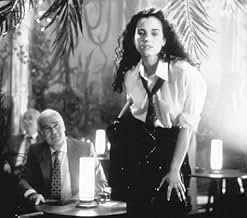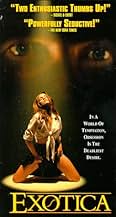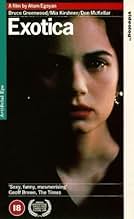NOTE IMDb
7,0/10
22 k
MA NOTE
Un homme en proie à des névroses fréquente le club Exotica pour tenter de trouver du réconfort, mais même là, son passé n'est jamais très loin.Un homme en proie à des névroses fréquente le club Exotica pour tenter de trouver du réconfort, mais même là, son passé n'est jamais très loin.Un homme en proie à des névroses fréquente le club Exotica pour tenter de trouver du réconfort, mais même là, son passé n'est jamais très loin.
- Récompenses
- 16 victoires et 12 nominations au total
Maury Chaykin
- Exotica Club Client
- (non crédité)
C.J. Lusby
- Exotica Club Dancer
- (non crédité)
Nadine Ramkisson
- Exotica Club Dancer
- (non crédité)
Avis à la une
Like other Egoyan films, this one starts like an incomplete jigsaw puzzle, with the missing pieces added as it progresses. However, it is not the plot that is the most important part of the film but the intriguing interactions between the characters. There's the auditor trying to overcome a painful past while reviewing the books of the gay pet shop owner. Then there's the lesbian strip club owner, the jailbird stripper, and the DJ who completes the volatile love triangle. There is fine acting by the entire cast, with Greenwood and Koteas specially good. The music by Danna perfectly underscores the sense of mystery. Egoyan masterfully balances the plot lines until the pieces come together to form a nearly complete picture - there are still unanswered questions for the viewer to ponder!
'Exotica' is clearly Egoyan's best film and his most successful presentation of the motifs that have characterized his films throughout his career; these include the presentation of the narrative out of chronological order, the interaction of characters by means of videotape and hidden surveillance, the relationship between parent and child, and the repetition of situation and dialogue. The film's theme involves the superficial barriers-both physical and psychological-that prevent people from making a genuine emotional connection with others; as we watch the film we witness how various people react to these barriers and struggle to break them down. The film's strong emphasis on structure and focus on Thomas' and Francis' parallel 'hunts' for human contact can't help but remind of that masterpiece of medieval literature 'Sir Gawain and the Green Knight' (this is a work that Egoyan was born to adapt to the screen). In my opinion each of the film's six major characters parallels another to compile three pairs. The first pair of characters is composed of Thomas and Zoe. The most obvious similarity between these two is that each owns one of the film's two principle locations. Thomas' pet store and Zoë's strip-club are comparable in that both are businesses whose principle merchandise is living creatures that are excessively displayed so as to persuade the customer to make a purchase. Moreover, while the pet store is lined with glass cages and fish-tanks, the walls of the strip-club are composed of two-way mirrors through which employees can secretly observe the customers. In addition to the life that each openly sells, both also possess hidden life. We see this in Zoë by the fact that she is very pregnant, but must disguise her appearance so as not to remind customers of the possible consequences of the lecherous behavior that her club encourages. Likewise, in the film's first scenes we see that Thomas is pregnant in a different way. Here, he is smuggling exotic bird eggs into the country by strapping the eggs to his stomach in order to hide them from Canadian customs officials. This hidden life also extends to their introverted personalities. To combat their inability to communicate verbally, both try to make interpersonal connections by means of physical contact. In a sense, then, Thomas and Zoë (as the Greek origin of her name might suggest) are givers of life both openly in their businesses and privately in their interaction with others. Next, Francis and Eric are parallel characters because of their mutual obsessions with Christina. Although Christina is intended to be seen as a sex object, neither Francis nor Eric has any interest in her in this regard. Instead, she symbolizes an emotional relationship that both once had, but now have lost. When they eventually discover their real relationship, Francis and Eric find that they do not need Christina and make an emotional bond with each other, which is symbolized by a physical embrace. Lastly, Christina and Tracey can be associated because Francis considers both as symbols of his dead daughter. However, Francis' relationships with Christina and Tracey both fail because he is unable to develop bonds that go beyond their assigned roles as a stripper and babysitter. Therefore, while Zoë and Thomas can be seen as givers of life, Christina and Tracey clearly receive life by taking on the roles that Francis and Eric impose on them. There are also many reoccuring images and symbols that reinforce the emotional isolation of the characters. The use of secret surveillance by two-way mirrors serves both as an invisible yet uncrossable boundary between people who would otherwise be very close to one another and as a way for the characters to make private judgments of those who are being unwittingly observed. In fact, while Eric secretly observes and judges Francis during his nights at Exotica, Francis, because of this job as an auditor, does the same to Thomas during the day. Egoyan reminds us that this relationship can ultimately be extended to include the audience members, who also make private judgments of the film's characters (we've this before in films like Hitchcock's 'Rear Window' and Powell's 'Peeping Tom'). As we watch the film, we too are in a sense reaching out to forge an emotional connection that transcends the barrier of the medium itself. The film's overriding presence of money suggests to the characters that the only legitimate grounds for a relationship is financial, and any time an emotional connection is made the characters feel guilty if they are not paying for it. Finally, the frequent appearance of parrots and their uncharacteristic silence reflects the characters' inability to communicate and overcome the losses of their past. I've really grown to admire this film and Egoyan's work in general. In 'Exotica' he creates a work of complex symmetry and interconnecting symbols while also conveying an atmosphere of lyrical intensity.
10jon-88
Perhaps Atom Egoyan's most successful film. Egoyan's technique is to fracture a story like a jigsaw puzzle, giving the viewer bits and pieces which only all connect in the final scene. That ripping apart of reality is especially appropriate here, since the movie is about people putting their lives together after terrible trauma. It's also about the danger in leaping to conclusions - the viewer is often tempted to make a judgement about what he or she sees, and that judgement is often both wrong and unfair. If this all sounds like homework, be assured that the movie is also a lot of fun: it's sexy and interesting and inspired.
I can't remember seeing a film as intriguing, complex, and beautifully photographed as "Exotica." I nearly didn't watch it because the video cover advertized it as an "erotic thriller" and the image on the front is of Mia Kirchner doing her strip-tease bit. Granted, "Exotica" centers around a "gentleman's club" of the same name, but to call this film a simple erotic thriller is to miss out on a lot, on too much.
"Exotica" follows four seemingly unrelated storylines: a man sitting alone at a table in a strip club, another man smuggling exotic parrot eggs into the country ("Exotica" takes place in and around Toronto), two apparent strangers walking in a field of green, and a young girl who plays a flute in an empty house. Egoyan begins with these vastly different puzzle pieces then slowly, inexorably brings them together.
Atom Egoyan is one heck of a masterful director. He is the epicenter of this cinematic symphony that leads carefully from movement to movement until the finale bursts forth in equal measure of catharsis, discovery, and tragedy. Plot to him is like tapestry weaving. He threads narrative, characters, time, and setting in such complicated iterations that one is at once nearly overwhelmed by the intricacy and awed at his skill, a testament to his brilliance as well as his belief that a film-going audience is actually intelligent.
At it's heart, "Exotica" is a tragedy of circumstances. Or better yet, a collision of tragedies of circumstances. Indeed, the film isn't so much about tragedy as it is about those who survive tragedy and the toll a single event can exact for the rest of the lives of those who survive. Exotica, the gentleman's club, serves merely as a focal point where all these individual tragedies radiate to.
Equally haunting in all this is the music. Mychael Danna's score sets the film's tone: dark, "exotic," deceptively simple but savvier than it lets on. Also worthy of note is the music in the club itself, a blend of American house funk and Middle Eastern tones, warbled in Arabic.
I highly recommend this film. Ignore the naked women who sashay from time to time in front of the screen (difficult as that may be at times) in the scenes shot in the club. The really interesting stuff occurs at the margins of the film, as the gulf separating the storylines begin to vanish, and the final scene gives you the keystone to a horrifying clear vision of a sadness so overwhelming that no one in the film escapes unscathed.
"Exotica" follows four seemingly unrelated storylines: a man sitting alone at a table in a strip club, another man smuggling exotic parrot eggs into the country ("Exotica" takes place in and around Toronto), two apparent strangers walking in a field of green, and a young girl who plays a flute in an empty house. Egoyan begins with these vastly different puzzle pieces then slowly, inexorably brings them together.
Atom Egoyan is one heck of a masterful director. He is the epicenter of this cinematic symphony that leads carefully from movement to movement until the finale bursts forth in equal measure of catharsis, discovery, and tragedy. Plot to him is like tapestry weaving. He threads narrative, characters, time, and setting in such complicated iterations that one is at once nearly overwhelmed by the intricacy and awed at his skill, a testament to his brilliance as well as his belief that a film-going audience is actually intelligent.
At it's heart, "Exotica" is a tragedy of circumstances. Or better yet, a collision of tragedies of circumstances. Indeed, the film isn't so much about tragedy as it is about those who survive tragedy and the toll a single event can exact for the rest of the lives of those who survive. Exotica, the gentleman's club, serves merely as a focal point where all these individual tragedies radiate to.
Equally haunting in all this is the music. Mychael Danna's score sets the film's tone: dark, "exotic," deceptively simple but savvier than it lets on. Also worthy of note is the music in the club itself, a blend of American house funk and Middle Eastern tones, warbled in Arabic.
I highly recommend this film. Ignore the naked women who sashay from time to time in front of the screen (difficult as that may be at times) in the scenes shot in the club. The really interesting stuff occurs at the margins of the film, as the gulf separating the storylines begin to vanish, and the final scene gives you the keystone to a horrifying clear vision of a sadness so overwhelming that no one in the film escapes unscathed.
Just seen this for the second time. First time I saw it (about a year ago), I wasn't really sure what to make of it, but there were scenes from it (when Elias Koteas reveals why his connection to the disturbed and grieving father and the scene with the father and his daughter's babysitter at the end) that have always stuck in my mind.
A very haunting and beautiful movie (even though it gives a very unpleasant view of life), with a haunting snake charm style score and starring the brilliant Elias Koteas (from "Crash") and the lovely Mia Kirshner (from early first season "24" and "The Crow: City Of Angels"). Victor Garber (Sidney's dad in "Alias") also has a couple of scenes. Not to many tastes but very rewarding if you can appreciate it (although it's sense of detachment probably puts off a lot of people).
It seems to me to explore the theme of people trying to connect, in a very insular and ultimately unfulfilling way (the young gay man who goes to the ballet every night and gives away his "extra ticket" for companionship or the grieving father who pays a young girl to "babysit" his empty house so that he can have the illusion his daughter is still around for example), and also the theme of loss (variously of loved ones, innocence, youth, opportunity etc). The Exotica strip club seems such hollow place but at the same time it seems almost understandable that it would draw hapless souls night after night with nowhere else to go. Some of the dialogue seems poetic, cynical and truthful all at the same time. A film that you really need to watch to the end before you really feel you understand it's puzzle (and even then there seems to be something just out of grasp this viewing). A moving portrait of life that will linger in your mind afterwards.
A very haunting and beautiful movie (even though it gives a very unpleasant view of life), with a haunting snake charm style score and starring the brilliant Elias Koteas (from "Crash") and the lovely Mia Kirshner (from early first season "24" and "The Crow: City Of Angels"). Victor Garber (Sidney's dad in "Alias") also has a couple of scenes. Not to many tastes but very rewarding if you can appreciate it (although it's sense of detachment probably puts off a lot of people).
It seems to me to explore the theme of people trying to connect, in a very insular and ultimately unfulfilling way (the young gay man who goes to the ballet every night and gives away his "extra ticket" for companionship or the grieving father who pays a young girl to "babysit" his empty house so that he can have the illusion his daughter is still around for example), and also the theme of loss (variously of loved ones, innocence, youth, opportunity etc). The Exotica strip club seems such hollow place but at the same time it seems almost understandable that it would draw hapless souls night after night with nowhere else to go. Some of the dialogue seems poetic, cynical and truthful all at the same time. A film that you really need to watch to the end before you really feel you understand it's puzzle (and even then there seems to be something just out of grasp this viewing). A moving portrait of life that will linger in your mind afterwards.
Le saviez-vous
- AnecdotesAtom Egoyan says that the film was inspired by three experiences: being taken to a lesbian club where women onstage performed as men; having a tax auditor suggest to him (incorrectly) that he was being cheated by a business partner; and realizing as a teenager that a friend was trapped in an incestuous relationship.
- GaffesIn one scene when Eric is talking with Cristina walking on the grass, you can see a microphone at the top of the screen.
- Bandes originalesEverybody Knows
Performed by Leonard Cohen
Written by Leonard Cohen and Sharon Robinson
Published by Leonard Cohen Stranger Music, Inc. (BMI) and Geffen Music
Courtesy of Sony Music Entertainment (Canada) Inc.
Meilleurs choix
Connectez-vous pour évaluer et suivre la liste de favoris afin de recevoir des recommandations personnalisées
- How long is Exotica?Alimenté par Alexa
Détails
- Date de sortie
- Pays d’origine
- Langues
- Aussi connu sous le nom de
- Exótica
- Lieux de tournage
- Osgoode Hall, Toronto, Ontario, Canada(opera exteriors)
- Sociétés de production
- Voir plus de crédits d'entreprise sur IMDbPro
Box-office
- Budget
- 2 000 000 $CA (estimé)
- Montant brut aux États-Unis et au Canada
- 4 221 036 $US
- Week-end de sortie aux États-Unis et au Canada
- 100 654 $US
- 5 mars 1995
- Montant brut mondial
- 4 221 036 $US
Contribuer à cette page
Suggérer une modification ou ajouter du contenu manquant





































